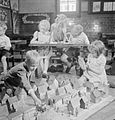Teens Growing Up Quickly

May 24, 2016
When her mother got diagnosed with breast cancer at the age of 32, a Davis junior was forced to grow up quickly. In and out of hospitals constantly for four years, her mom didn’t have the strength to take care of a family. At the young age of 11 this girl had the responsibility of doing laundry, making meals, getting her younger brothers ready for school, and ensuring that everyone is where they need to be while still trying to be young. Other circumstances that require children to grow up early are trauma, and rebellion.
“Having fun, going out and doing things, it was hard for a while. I felt the need to stay home and just take care of my brothers. I wanted to make sure our home still felt like a home even though my mom was constantly in and out of hospitals and recovering,” an anonymous student said. “You try and try to seem normal, but you still end up feeling like the mom. Everyone noticed.”
The idea of growing up quickly to be a factor in the psychological health of children has been debated among many psychologists, sociologists, and Universities as well as several medical journals and boards.
“Children who are rushed to grow up before they are ready may develop stress-related health problems,” Vision Reporter Rebecca Sweat said in Whatever Happened to Childhood. “Many of these problems include nervousness, hyperactivity, eating and sleeping disorders, and headaches and stomach problems.”
Forcing kids to grow up isn’t necessarily always done by leaving them home alone or depending on them to take care of their family, it also can be done by overcrowding of the child’s schedule. When they have their days planned out and packed full of activities they are more likely to become stressed out. So while they are being taught beneficial life skills, it affects the ability to become healthy, happy adults.
“There’s a developmental process that [children] have to go through that they miss out on when they grow up too quickly,” Davis High School psychologist Shalon Nay said. “This can make children miss out on experiences that help aid them in these processes.”
The “latchkey kids” are being taught to schedule and fill their lives at such an early age. This isn’t necessarily a problem according to the findings of the American Psychological Association. Adolescents are not less mature than adults according to their performances in cognitive abilities, but extremely active hormones manipulate the teens’ and young adults’ emotional well-being.
“It is crucial to understand that brain systems responsible for logical reasoning and basic information processing mature earlier than systems responsible for self-regulation and the coordination of emotion and thinking,” psychology PhD Laurence Steinberg said in the American Psychological Association’s article While Adolescents May Reason As Well As Adults, Their Emotional Maturity Lags.
Parents’ busy schedules affect whether or not their children grow dependent on them and their resources. The way that adults raise their kin is a likely reflection of the way that those particular children will end up. Some of these kids are what have been coined in modern day as overprotected children, similar to the latchkey kids.
“It has to do with the lack of independence people allow their children these days,” statistics researcher Hanna Rosin said in her article titled Hey Parents: Leave Those Kids Alone.
Kids have been growing up way too quickly in social norms as well as in their powers to make wise and educated choices.
“When I found out my mom had been diagnosed with breast cancer, it completely changed my life. I lost a lot of motivation to do things. I wasn’t getting anything done because all I could think about was what was going to happen to her,” junior Hannah Shill said. “I was under so much stress, I don’t even know how I was able to function.”
While the maturity rate of children may be rising, so have the suicide numbers among teens and tweens. They had more than doubled in the twenty years between 1975 and 1995. Tweens are also more likely to be more violent and get into more trouble.
“I try to remind the students that come to me with the things that make them grow up quickly that they still need to go out and have experiences,” Nay said. “They have to remember to still be kids and that it’s okay to have fun too.”
The importance of a structured home affects the outcome and future of the children within them. While not bad for every individual, forcing too many responsibilities on a child obstructs them from becoming the best grown-up that they can be.




























